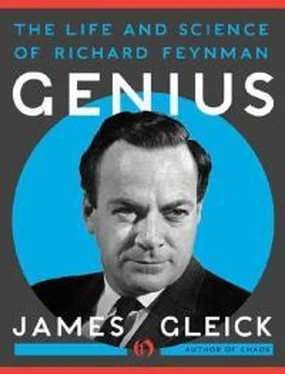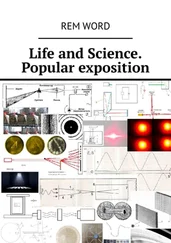252 HIS LECTURE DREW A CROWD: “The Prodigy Who Grew,”
Newsweek, 23 February 1948, 45–46; Wil iam L.
Laurence, “New Guide Offered on Atom Research,”
New York Times , 1 February 1948; Stephen White,
“Physics Society Hears Theory of Electron Action,” New York Herald Tribune, 1 February 1948, 51.
252 I DID IT TOO, DADDY: F-W, 463–64.
252 I’M SO SORRY: Rose McSherry to Feynman, 21 January, 1948, PERS.
253 MONTHS PASSED BEFORE FEYNMAN CALLED: Feynman formal y acknowledged the error in a footnote to a paper published the next year; he juggled the footnotes so that the apology would fal in number 13: “That the result… was in error was repeatedly pointed out to the author, in private communication, by V. F. Weisskopf and J. B. French…. The author feels unhappily responsible for the very considerable delay in the publication of French’s result occasioned by this error.”
Feynman 1949b, 777; Weisskopf, interview; Weisskopf
1991, 168.
253 A HOLE IF THERE WERE ONE: Dirac in Proceedings of the Royal Society of London A 133(1931):60.
253 SUPPOSE A BLACK THREAD: Feynman 1948 f 2–3.
254 A C ORNELL STUDENT WHO HAD SERVED: Schweber 1986a, 488.
254 A BOMBARDIER WATCHING A SINGLE ROAD : Feynman 1948 f , 4; cf. Feynman 1949a, 749.
254 HE KNEW FROM HIS OLD WORK: Feynman 1947, 1.
255 USUAL THEORY SAYS NO: Ibid., 4.
255 IT MAY PROVE USEFUL IN PHYSICS: Ibid.
256 FEYNMAN GLEEFULLY SAID: Marshak, interview. Instead these mesons were named muon and pion, after Greek letters.
256 AS THE POCONO MEETING OPENED: Wheeler 1948.
256 EACH SMALL VOLUME OF SPACE: Ibid.
257 SCHWINGER HATED THIS: Schwinger, interview.
257 BETHE NOTICED THAT THE FORMAL MATHEMATICS : F-W, 469; Bethe, interview.
257 FERMI, GLANCING ABOUT: Segrè 1970, 174.
257 THIS IS A MATHEMATICAL FORMULA: F-W, 470.
258 HE THOUGHT IT INTELLECTUALLY REPULSIVE: Schwinger, interview.
258 BOHR HAS RAISED THE QUESTION: Wheeler 1948.
258 BOHR CONTINUED FOR LONG MINUTES: F-W, 473; cf. Pais 1986, 459, but this conflates Tel er’s and Bohr’s objections.
258 I HAD TOO MUCH STUFF: F-Sch.
258 ON HIS FIRST DAY BACK: Arthur Wightman, interview, Princeton, N.J.
259 YOU CAN IMAGINE THAT I WAS HIGHLY PLEASED : Quoted in Schweber, forthcoming. 259 ANONYMOUSLY, HE HOPED : Feynman 1948e, 9.
259 A MAJOR PORTION OF THE CONFERENCE: Ibid., 5.
259 WHEN SCHWINGER SAW FEYNMAN’S NAME: Schwinger 1983, 342.
260 TOMONAGA, A NATIVE OF TOKYO: Tomonaga 1966, 127–29.
260 AFTER SUPPER I TOOK UP MY PHYSICS: Quoted in Julian Schwinger, ‘Two Shakers of Physics,” in Brown and Hoddeson 1983, 357–58.
260 HE MADE A HOME: Schweber, forthcoming.
261 JUST BECAUSE WE WERE ABLE: Oppenheimer to Members of the Pocono Conference, 5 April 1948, OPP.
261 OTHER PEOPLE PUBLISH TO SHOW HOW: Dyson 1965a, 428.
261 SCHWINGER OCCASIONALLY HEARD: Schwinger 1983, 341.
261 I GATHER I STAND ACCUSED: Ibid.
261 ARE WE TALKING ABOUT PARTICLES: Schwinger, interview.
262 YOUR SUDDEN DEPARTURE FROM ITHACA: Lloyd P. Smith to Feynman, 13 June 1947, CIT.
263 FEYNMAN THOUGHT DYSON: WDY, 65.
263 DYSON LIKED THE ROLE: Dyson to parents, 25 June 1948.
263 HE HAD DECIDED THAT MODERN AMERICA: Dyson to parents, 14 June 1948.
263 AN ATOMIC BLAST ON EAST 20TH STREET: Morrison 1946; SYJ, 118.
264 DYSON SUDDENLY FELT THAT FEYNMAN : Dyson 1979, 59; Dyson to parents, 25 June 1948.
264 AS WE DROVE THROUGH CLEVELAND: Dyson 1979, 60–61.
264 SOMETIMES IT OCCURRED TO HIM: F-W, 532.
264 DYSON HAD NEVER SEEN RAIN: Dyson 1979, 59.
264 THE CAR RADIO REPORTED: Dyson to parents, 25 June 1948.
264 THIS HOTEL IS UNDER NEW MANAGEMENT: WDY, 65.
265 IN THAT LITTLE ROOM: Dyson 1979, 59.
265 THE ROOM WAS FAIRLY CLEAN : WDY, 66. Dyson, far from taking offense, merely commented that he had left out
“the best part of the story.” Dyson 1989, 38.
266 THAT STORMY NIGHT IN OUR LITTLE ROOM: Dyson 1979, 63.
266 ON WEDNESDAY OPPENHEIMER RETURNS: Dyson to parents, 10 October 1948, quoted in Schweber, forthcoming.
267 THERE WASN’T ENOUGH ROOM: Leonard Eyges to Dyson, quoted in Schweber, forthcoming.
267 A UNIFIED DEVELOPMENT OF THE SUBJECT: Dyson 1949a, 486.
267 THERE IS THE FATHER INCOMPREHENSIBLE: Dyson 1989, 35–36.
2 6 7 ANY MODERATELY INTELLIGIBLE ACCOUNT : Dyson to parents, 4 October 1948.
267 SO THE RESULT OF ALL THIS: Ibid.
268 THEIR EVALUATION GIVES RISE: Dyson 1949a, 491.
268 WRITE DOWN THE MATRIX ELEMENTS: Ibid., 495.
268 IT WAS “SCHWINGER’S THEORY": Oppenheimer 1948.
269 DEAR FREEMAN: I HOPE YOU DID NOT GO BRAGGING:
Feynman to Dyson, 29 October 1948, CIT.
270 WELL, DOC, YOU’RE IN: Dyson to parents, quoted in Schweber, forthcoming.
270 FEYNMAN HAD NOT LEARNED: NL, 452.
271 HE BUTTONHOLED SLOTNICK: F-W, 489–92.; NL, 452; F-Sch; Schweber, forthcoming.
271 WHAT ABOUT SLOTNICK’S CALCULATION?: Later Case sent Feynman his manuscript, and Feynman found an algebraic error that undermined the proof. F-W, 495–
96.
271 THERE WERE VISIONS AT LARGE: Schwinger 1983, 343.
272 THE REST MASS PARTICLES HAVE: Feynman 1948b, 943.
272 FEYNMAN AND I REALLY UNDERSTAND EACH OTHER: Dyson to parents, 1 November 1948.
272 FEYNMAN’S STUDENTS, HOWEVER, SOMETIMES NOTICED: Baranger, interview.
272 HE HAD STARTED HEARING ABOUT DYSON GRAPHS: Cf. F-W, 501.
272 WENTZEL HIMSELF: Crease and Mann 1986, 143.
273 FEYNMAN STRESSED HOW FREE: Feynman 1949b, 773.
275 FOR A WHILE IT WAS ALL SCHWINGER: F-W, 499.
275 IN THE SUMMER OF 1950: J. Ashkin, T. Auerbach, and R.
Marshak, “Notes on a Possible Annihilation Process for Negative Protons,” Physical Review 79(1950):266.
2 7 5 A TECHNIQUE DUE TO FEYNMAN: K. A. Brueckner, “The Production of Mesons by Photons,” Physical Review 79(1950):641.
275 THE UNREASONABLE POWER OF THE DIAGRAMS: Segrè 1980, 274.
276 LIKE THE SILICON CHIP: Schwinger 1983, 343. 276
PEDAGOGY, NOT PHYSICS: Ibid., 347.
276 YES, ONE CAN ANALYZE EXPERIENCE: Ibid., 343.
277 ALTHOUGH ‘ONE’ IS NOT PERFECTLY: Bernstein 1987, 63.
277 THEY ALSO WORRIED ABOUT SCHWINCER’S ABILITY: Sheldon Glashow, interview, Cambridge, Mass.
277 MURRAY GELL-MANN LATER SPENT A SEMESTER : Murray Gel -Mann, interviews, Pasadena and Chicago.
278 THERE WAS A NEW NOTE : E.g., Virginia Prewett, “I Homesteaded in Brazil,” Saturday Evening Post, 22
April 1950, 10, began, “It’s going to be the first atomic-bomb shelter in the New World.” Cf. F-W, 551.
2 7 8 AT LEAST A 40 PERCENT CHANCE OF WAR : Wheeler to Feynman, 29 March 1951, CIT.
278 WHEN A BRAZILIAN PHYSICIST: Lopes 1988; J. Leite Lopes, personal communication.
278 LATE THE NEXT WINTER HE IMPULSIVELY ASKED : Jayme Tiomno to Feynman, 6 March 1950, PERS. The Brazilians replied that a one-year appointment was the best they could offer at the time.
278 HE HAD ENDURED ONE TOO MANY DAYS: F-W, 546; Bacher, interview.
278 ALL THE INS AND OUTS: Feynman to Bacher, 6 April 1950, PERS.
278 I DO NOT LIKE TO SUGGEST: Ibid.
279 ONCE (AND IT WAS NOT YESTERDAY): Cvitanoviç 1983, 6.
CALTECH
Three local histories are Judith Goodstein’s Millikan’s School, Ann Scheid’s Pasadena: Crown of the Valley, and Kevin Starr’s Inventing the Dream; they were useful background, as was Robert Kargon’s essay ‘Temple to Science.” I’ve also relied on the recol ections of many present and former Caltech professors, students, and administrators. Some information on Feynman’s time in Brazil comes from the recol ections of José Leite Lopes (1988 and personal communication), Cecile Dewitt-Morette,
Читать дальше












